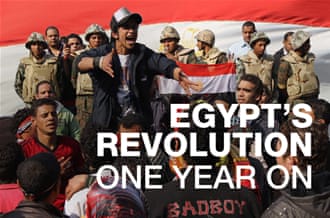| |||||
| Read an excerpt from the preface of Marwan Bishara's latest book, The Invisible Arab. Last Modified: 01 Feb 2012 16:13 | |||||
The following is the first of a series of excerpts that Al Jazeera will be publishing from The Invisible Arab: The promise and peril of the Arab revolutions. In much of the world's media, the narrative goes like this: An oppressed people who have suffered passively suddenly decide that enough is enough and, thanks to Western technology and inspiration, spontaneously rise up to reclaim their freedom, inspiring what is called the Arab Spring. Like most revolutions, however, this one was a long time coming. The historic takeover of Tunis's November 7 Square, Cairo's Tahrir Square, and Manama's Pearl Square, among others, were the culmination of a long social and political struggle - countless sit-ins, strikes, pickets, and demonstrations by people who risked and suffered intimidation, torture, and imprisonment. What started as a desperate act of self-immolation by Mohamed Bouazizi, a street vendor, soon became a viral event on the internet, one that led angry Tunisians to pour into the streets by the thousands. Demonstrations turned into national upheaval and culminated in a full-fledged revolution that toppled the Tunisian dictatorship and spread east to other countries to kindle the greatest Arab transformation in memory. Never had the region witnessed such collective vigour and yearning for change.
If we are to do justice to the immense courage of those who stood up to - and in some cases brought down - their regimes, we need to not only recognise their determination, but also listen to what they have said and are saying about how to bring justice and democracy to the Middle East. We also need to back their efforts in every way possible. They have earned the right - with their blood and, in many cases, lives - to be respected and supported. This story begins with the young Arabs whose networking and organisation brought the people out into the streets. The youth, who make up 60 per cent of all Arabs, have been looked upon as a "demographic bomb", an "economic burden", or as a "reservoir for extremism". However, unlike previous generations, this group heralded change.
For centuries these Arab citizens and their social and political movements have been either unfairly demonised or totally ignored in the West - by both its leaders and the media - who saw the region through the prisms of Israel, oil, terrorism, or radical Islamism. But today's Arabs are presenting a stark contrast to the distortion, disinformation, and outright humiliation heaped upon them. Characterised as unreceptive to democracy and freedom, they are now giving the world a lesson in both. Marwan Bishara is Al Jazeera's senior political analyst and a former professor of international relations at the American University of Paris. The above excerpt is from his latest book, The Invisible Arab: The promise and peril of the Arab revolutions, out in bookstores now. Follow him on Twitter: @MarwanBishara | |||||
| Source: Al Jazeera | |||||
| |
Islam is the real positive change that you need to change for being a better person or a perfect human being, you can change yourself if you read QURAN, IF YOU DO THAT !! you will change this UMMAH, say I am not A Sunni or Shia, BUT I am just a MUSLIM. Be a walking QURAN among human-being AND GUIDE THEM TO THE RIGHT PATH.
Wednesday, February 1, 2012
The Invisible Arab: Excerpt from the preface
AL Jazeera indepth
Subscribe to:
Post Comments (Atom)









No comments:
Post a Comment